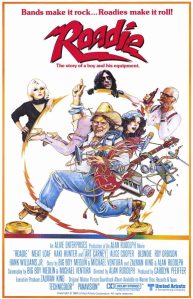 The fine folks at Shout Factory continue to bring obscure, fondly-remembered and unique movies and TV shows back to the marketplace. Often the result is an overlooked gem such as TV’s The Middleman; other times, it’s stuff like Roadie.
The fine folks at Shout Factory continue to bring obscure, fondly-remembered and unique movies and TV shows back to the marketplace. Often the result is an overlooked gem such as TV’s The Middleman; other times, it’s stuff like Roadie.
In concept, 1980’s Roadie ought to be a cult classic, and it has been marketed as one over the years; it has many of the usual elements, including big actors in small parts, celebrities playing satirical versions of themselves, a hit-laden soundtrack, oddball characters in a convoluted plot, etc. On paper, this all sounds like a recipe for a silly little movie that people would embrace; in execution it falls flat and lays there for 106 long minutes. This is an example of the down-side of Patton Oswalt’s famous “ETEWAF” (Everything That Ever Was, Available Forever.)
I had missed this film when it was in theaters, despite being at the time (guilty pleasure confession!) a fan of both The Rocky Horror Picture Show and the Bat Out of Hell album, so when Shout Factory offered to send it to me, I was looking forward to it. What a difference 30 years makes: I might have found Roadie more amusing at 22, though I kinda doubt it. I have always loved terrible movies, as my kids can attest. The problem is this one is merely bad, not terrible, and that’s its failing.
Meat Loaf plays a Texas truck driver named Travis W. Redfish, who has the ability to fix just about anything using whatever cast-off materials are available. He meets and is immediately smitten by Lola, the girl of his dreams (Kaki Hunter, best known for the Porky’s movies) who turns out to be a groupie on her way to New York in pursuit of Alice Cooper. Travis’ improvisational engineering skills make him an ideal roadie, and after repairing their bus, he gets hired on with the touring rock band with whom Lola is traveling. Antics follow, along with cameo appearances by Cooper, Blondie, Hank Williams Jr., Roy Orbison, and the band Asleep at the Wheel. Art Carney plays Travis’ father, a cantankerous inventor and owner of a salvage yard. Soul Train host Don Cornelius plays a concert promoter clearly modeled after Don King, and the rest of the cast is comprised of people you’ve never heard of.
The script, by former journalists Michael Ventura and Jimmy “Big Boy” Medlin, based on a recurring character from Medlin’s columns for the Austin Sun and LA Weekly newspapers, ought to have made an entertaining and quirky movie, but for some reason the production never quite gels. Meat Loaf turns in a respectable performance as Redfish, but he seems like a supporting player in his own movie. He realistically portrays an unsophisticated but brilliant rustic, but he’s not a compelling lead character and the audience has little reason to root for him as he attempts to win the affections of the very annoying Lola. One of the recurring plot-points concerns Redfish’s tendency to suffer “brainlock” after incurring a head injury, in which he stares into space, moves robotically, and spews nonsensical dialog such as “I sure wish I was here. Maybe I’ll get here soon.” This device serves to move the plot forward a couple of times, but it’s more off-putting than funny. Carney is given very little to do apart from deploying inventive gadgets and repeating his tag-line, “everything works if you let it.” Most of the supporting cast are similarly under-served by the script, especially Joe Spano (Hill Street Blues) as a sleazy band manager whose jealousy of Redfish is never satisfactorily resolved. The ad campaign for the film was built around Lola’s line, “the band makes it rock but the roadies make it roll.” Unfortunately, apart from Travis, we see very little of the other roadies, and what we do see establishes them as continually intoxicated, foolish and not very bright. We see very little of what they do or how they do it, an omission that stands out when it’s ostensibly the central theme of the film.
In short, the film has all the requisite elements of a cult classic (except, surprisingly, gratuitous sexuality and displays of flesh; Roadie is pretty chaste for a movie whose plot revolves around young Lola’s quest to “lose it” to Alice Cooper, especially given that it was co-produced by Zalman King, the pioneer of soft-core sleaze for cable), but as hard as the marketing people have tried to sell it, it lacks whatever hooks are necessary to grab the audience the way true cult classics do. Everything is pretty pedestrian, even the car crashes. Director Alan Rudolph, better known for arty works like Welcome to L.A. and Trouble in Mind, puts everyone through their perfunctory paces in a paint-by-numbers way. There’s nothing much to engage the audience, unless they are huge fans of second-tier ’70s rock performers slumming in a marginally entertaining movie. There are a couple of chuckles to be had, such as the elder Redfish’s inventions and a quick riff on Midnight Cowboy, but the laughs are few. Of the celebrity cameos, Alice Cooper makes the most of his, though Blondie’s Debbie Harry plays along gamely and turns in a nice rendition of the Johnny Cash classic, “Ring of Fire.” Oddly, Meat Loaf doesn’t appear in the soundtrack at all.
The new Blu-ray edition from Shout Factory looks good on the screen, but the overall package is pretty thin; the bonus features consist entirely of the theatrical trailer and a commentary track by the writers.
There are certainly people out there who love this movie for one reason or another; several of them have written glowing reviews at IMDB and Amazon, and this release is no doubt for their benefit. I doubt it’s going to find a new audience at this late date; unlike true cult classics such as Empire Records or Phantom of the Paradise, Roadie is an artifact of its time, lacking any real timeless message or emotional life to make it endearing or relevant for anyone who wasn’t at least in their teens in 1980.




